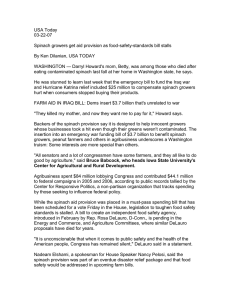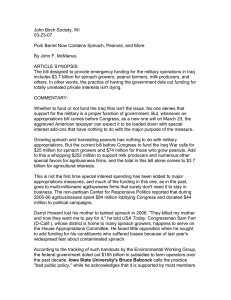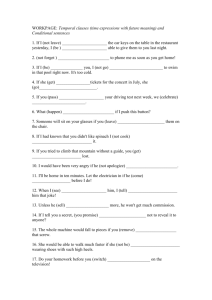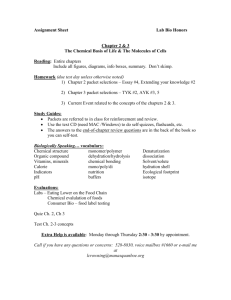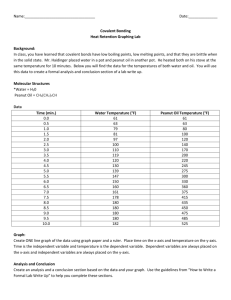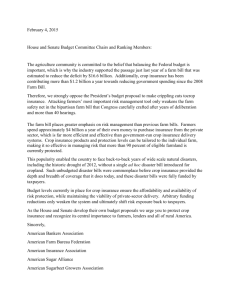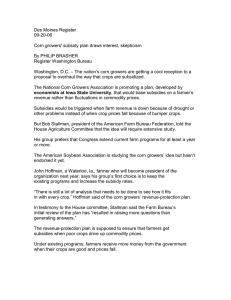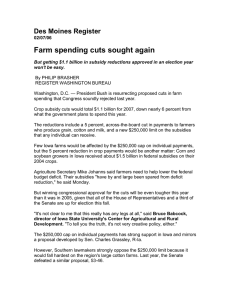USA Today 03-22-07 Spinach growers get aid provision as food-safety-standards bill stalls
advertisement
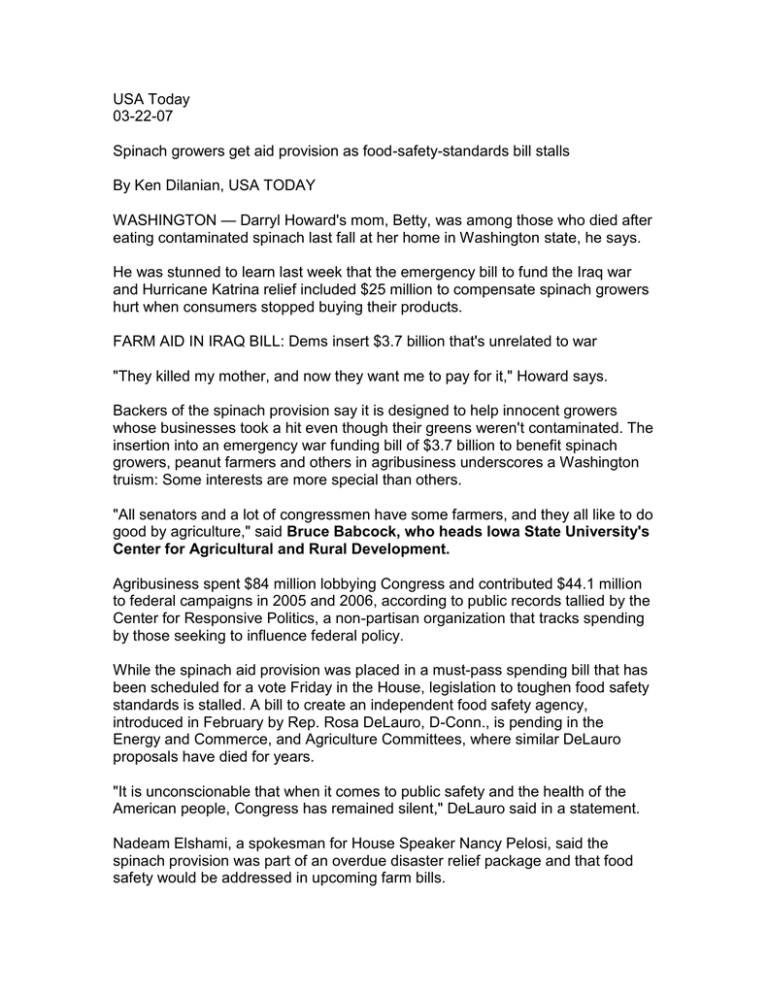
USA Today 03-22-07 Spinach growers get aid provision as food-safety-standards bill stalls By Ken Dilanian, USA TODAY WASHINGTON — Darryl Howard's mom, Betty, was among those who died after eating contaminated spinach last fall at her home in Washington state, he says. He was stunned to learn last week that the emergency bill to fund the Iraq war and Hurricane Katrina relief included $25 million to compensate spinach growers hurt when consumers stopped buying their products. FARM AID IN IRAQ BILL: Dems insert $3.7 billion that's unrelated to war "They killed my mother, and now they want me to pay for it," Howard says. Backers of the spinach provision say it is designed to help innocent growers whose businesses took a hit even though their greens weren't contaminated. The insertion into an emergency war funding bill of $3.7 billion to benefit spinach growers, peanut farmers and others in agribusiness underscores a Washington truism: Some interests are more special than others. "All senators and a lot of congressmen have some farmers, and they all like to do good by agriculture," said Bruce Babcock, who heads Iowa State University's Center for Agricultural and Rural Development. Agribusiness spent $84 million lobbying Congress and contributed $44.1 million to federal campaigns in 2005 and 2006, according to public records tallied by the Center for Responsive Politics, a non-partisan organization that tracks spending by those seeking to influence federal policy. While the spinach aid provision was placed in a must-pass spending bill that has been scheduled for a vote Friday in the House, legislation to toughen food safety standards is stalled. A bill to create an independent food safety agency, introduced in February by Rep. Rosa DeLauro, D-Conn., is pending in the Energy and Commerce, and Agriculture Committees, where similar DeLauro proposals have died for years. "It is unconscionable that when it comes to public safety and the health of the American people, Congress has remained silent," DeLauro said in a statement. Nadeam Elshami, a spokesman for House Speaker Nancy Pelosi, said the spinach provision was part of an overdue disaster relief package and that food safety would be addressed in upcoming farm bills. Farm interests are no strangers to success in reaping benefits from government. The federal government provided $165 billion in farm subsidies from 1995 through 2005, according to the non-partisan Environmental Working Group, which tracks the spending. For years, voices in both parties have criticized farm subsidies as wasteful. President Bush, in his 2008 budget, proposed eliminating subsidies for farmers earning more than $200,000 annually. That idea will be taken up when Congress debates a farm bill later this year. Proponents say some level of subsidies are crucial to preserving domestic food production. "If we want farmers to grow crops in the U.S., we're going to have to subsidize them," said Michael Doyle who directs the University of Georgia's Center for Food Safety. Traditionally, spinach growers have not been large subsidy recipients. But Rep. Sam Farr, a California Democrat who represents the most Spinach-rich district in the country, sits on the Appropriations Committee, where he was able to secure the relief funding, he said. Farr expressed sympathy for the victims of contaminated spinach, but he said growers were victims, too. He noted that the industry voluntarily implemented new safety provisions after the spinach crisis. No one disputes that farmers have suffered losses from natural disasters in recent years — droughts on the Great Plains, freezes in citrus regions, Gulf Coast flooding and hurricanes. The question is whether the government should continue to fund disaster bailouts on an emergency basis — a process that values political influence over merit, said Ken Cook, Environmental Working Group president. The government has handed out $15 billion in farm disaster aid over the past 11 years, the group said in a recent report. "It's bad public policy," Babcock said. Bush, who has threatened to veto the bill because of the provision setting a timetable to withdraw from Iraq, said Monday that Congress shouldn't "use funding for our troops as leverage to get special interest spending for their districts." Not all the bill's farm provisions are disaster relief. Two of them — $74 million for peanut subsidies and $252 million for milk price supports — are designed to preserve subsidy programs that are set to expire. Emergency spending bills are used "to fill in the gaps of things that aren't full fledged disasters, but they kind of fit in the train as it's leaving the station," said Rep. Jack Kingston, a Georgia Republican, who supports the peanut provision but plans to vote against the bill because he opposes the troop withdrawal deadline. The peanut provision pays farmers to cover their storage and handling fees. In all, peanut subsidies cost taxpayers about $276 million in 2005, according to the working group. "If we do not maintain our food independence, ultimately we'll be held hostage," said Joe Boddiford, a Georgia peanut farmer who estimates the storage subsidy is worth $30,000 a year to him. In June, 2005, Boddiford contributed $1,000 to the campaign of Rep. Sanford Bishop, the Appropriations Committee member who takes credit for inserting the peanut measure. Boddiford said Bishop has been a staunch peanut advocate. Bishop said it was only natural that peanut interests contributed $35,750 to his most recent campaign. "They appreciate good government," he said, "and good government is a government that works in their best interest." Contributing: Kathy Kiely
